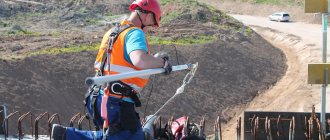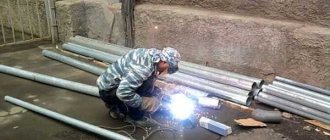Author: ProfGid
An electric gas welder is a specialist who welds and cuts metal products and structures: components, pipelines, parts, etc. The profession is wide-ranging and involves the use of different types of welding. By the way, in 2022, the ProfGid career guidance center developed an accurate career guidance test. He himself will tell you which professions are suitable for you, and give an opinion about your personality type and intelligence.
Short description
The profession is suitable for men prone to difficult work. The job responsibilities of electric and gas welders include (the list depends on the qualification category):
- preparing metal elements for welding;
- maintenance, minor repairs, adjustment of welding equipment;
- joining or cutting metal products;
- quality control of seams, their cleaning;
- cutting blanks from sheet metal, planing parts and other tasks.
It is necessary to have an excellent knowledge of all GOSTs related to welding, as well as the technological characteristics of metals, the structure of the weld, the design of the devices used, and safety precautions. A person who has the following medical contraindications cannot become an electric gas welder:
- cardiovascular and neuropsychiatric diseases;
- problems with the organs of hearing, smell, breathing.
An electric gas welder is a healthy person who does not suffer from a fear of heights. He is resistant to high physical stress, has diligence, the ability to concentrate, as well as visual memory and increased accuracy.
Health hazards and early retirement for electric and gas welders
Working with a welding machine is considered hazardous, so workers are entitled to benefits and privileges. Most often, welders suffer from vision and respiratory system problems. Eye problems occur due to excessive brightness of the electric arc or gas, and fine dust gets into the lungs
.
Another dangerous factor is infrared radiation. In addition, the fluxes used in EGS are hazardous substances.
The most dangerous job is for argon welders of titanium products. They work in special chambers filled with argon. At high concentrations in the air, this gas is poisonous to humans, so argon workers have to work in special protective suits and in half-hour shifts.
To receive benefits provided by the state, an employee must have a total work experience of at least 25 years, and work in one industry for 12.5 years.
Women also work in this profession. Their conditions are simpler - 20 years of general work experience and 10 years in the specialty.
How to become an electric and gas welder?
You can get basic education in the field of welding at a college or technical school. The best specialization is “Welder (manual and partially mechanized welding (surfacing))”, it can be mastered after 9th grade. The duration of training in welding-related professions is 10-46 months. People with the appropriate education can retrain as an electric and gas welder, undergo retraining, and gain additional professional knowledge:
- specialized secondary,
- initial professional.
Further education and advanced training courses are available at many Russian training centers. Please note that you can start working after reaching the full age of 18, because from this age the use of gas equipment is allowed. For admission you must also have an electrical safety certificate (group 2 up to 1000 V and above).
Gas-electric welder or electric-gas welder: which is correct?
In everyday life, you can use both options, since each of them reflects the essence of the work being performed. But to receive benefits you only need to use one name.
The occupational code for electric and gas welder according to OKPDTR is 19756.
The name is also contained in the following orders and resolutions
:
- Resolution
of the Ministry of Labor of the Russian Federation of November 15, 1999 No. 45. - Resolution of
the State Standard of the Russian Federation dated December 26, 1994 No. 367 (as amended on June 19, 2012). - Order
of the Ministry of Education and Science of Russia dated July 2, 2013 No. 513 (as amended on February 3, 2022). - Order
of Rosstandart dated December 12, 2014 No. 2022.
Also, according to ETKS, in the section “welding works” the name of the profession “electric and gas welder” is used.
Therefore, when filling out documents, especially a work book, you should use this word.
If the worker's profession is incorrectly indicated, he may lose benefits for hazardous work and pension benefits
. If the profession “gas-electric welder” is indicated in the work book, then the worker will not be able to retire early and receive the required payments. In this case, you should go to court to replace the position in the documents with the correct one.
Advantages and disadvantages
pros
- Electrical and gas welders are highly sought-after specialists.
- Opportunity to choose any field - from mechanical engineering to the agro-industrial sector.
- A large amount of professional knowledge that allows you to work in commercial or government companies, and take on additional private orders.
- Excellent level of remuneration, as well as fees for orders carried out privately.
- The services of electric and gas welders are in demand at any time of the year.
- It is possible to work on a rotational basis. In this case, the employer compensates for the costs of travel, food, and accommodation.
Minuses
- The profession belongs to the group of dangerous ones.
- Working conditions are very difficult.
- There is a high incidence of injuries, because electric and gas welders often work at heights and constantly use dangerous equipment.
- Responsibility for wear resistance and durability of welded structures.
Working conditions for an electric and gas welder
Electric gas welding is widely used in the construction of strategic facilities: main oil and gas pipelines, bridges and structures, industrial facilities. In this case, working as an electric and gas welder requires constant travel and shifts.
Another option for work is working at a large industrial enterprise
(shipbuilding, aircraft manufacturing, manufacturing of parts and spare parts for automobiles). Typically, such a worker has a shift schedule.
The third option is less critical objects in the construction industry. Electric and gas welders are engaged in the installation of heating systems, sewerage and water supply, and ventilation. The work schedule is also shifts, and the pay is negotiable.
In addition to skills in working with a welding machine, an electric and gas welder must:
- be able to draw and read blueprints;
- know fire safety and electrical safety (3rd class of electrical safety approval);
- know the standards and technical conditions for welding work;
- have basic knowledge of strength materials, properties of metals and alloys.
Photo source aleksandarlittlewolf/freepik
Training for electric and gas welders
You can learn to become a gas welder at secondary vocational schools.
It could be
:
- Vocational school.
- Technical College.
- College.
Usually one becomes an electric and gas welder at the place of work, so you can become a specialist in this area after receiving the profession of “welder”. But having a specialized education and a certificate as an electric and gas welder is an advantage in employment, since employers need ready-made specialists with work experience.
Electric and gas welder salary
Welding work is always in demand, as specialists are required during any construction work. An employee's income depends on his rank and work experience.
According to information from employee search services, a specialist can count on the following salary:
- Minimum
— from 17 thousand rubles
- Maximum
- up to 200 thousand rubles.
A specialist with extensive work experience can train and test welders.
Argon welders earn the highest salaries. The average salary of a welder is 60 thousand rubles.
Electric gas welder or gas electric welder: which is correct?
Since people in this profession have two names at once, not everyone knows which is correct - gas-electric welder or electric-gas welder? And if these are two different professions, then what is the difference between them?
In fact, both of these names are suitable for welders, as they correctly reflect the main points. There is “gas”, which refers to the use of gas in welding, “electric”, which hints at the use of current, and the main part is “welding” or “welder”. It makes no difference whether gas is mentioned before or after electricity.
Who is an electric gas welder?
An electric gas welder is a person who knows how to connect large metal parts using a welding machine. This ability is very important during construction:
- oil pipelines;
- gas pipelines;
- bridges;
- industrial facilities;
- heating systems, sewerage systems, water supply systems, ventilation systems.
Welding is also required for the assembly of parts of ships, air and land transport.
You can become an electric gas welder without special education, since all basic skills can be acquired with experience if a good master guides you and also explains the basics. However, special education allows you to receive 1 category after graduation. This will be an advantage when applying for a job.
Being a qualified welder is very profitable due to the high salaries in this field, career opportunities, as well as the high demand in the labor market.
But there are also disadvantages, since welders often work in shifts, and their working conditions are considered harmful and dangerous. This can cause health problems over time. But because of this, welders retire much earlier than the established age for everyone.
Discharges of electric and gas welders according to ETKS
The Unified Tariff and Qualification Directory of Work and Professions of Workers (UTKS) lists five qualification categories of electric and gas welders, starting with the second.
- Electric gas welder 2nd category
. Has the right only to cut metals and process scrap. A novice welder does not weld parts. Must know the structure of the welding machine and the features of metal processing. - Electric gas welder 3rd category
. Plasma, arc, manual welding of simple parts. Metal cutting. The worker must know how metals are combined when welding and be able to set up the welding machine. - Electric gas welder 4 categories
. Performs welding of complex parts and assemblies, uses all types of welding. Able to melt complex structures and read blueprints. - Electric gas welder 5th category
. Performs welding of complex units, apparatus and parts. Capable of machining parts to create complex joints. Can read any drawings. Knows how to weld reinforcement of foundations, columns and ceilings. - Electric gas welder 6th category
. Capable of working with the most complex titanium alloys. Knows all types of welding, knows how to set up and work with all welding machines. His work is mainly related to the creation of large structures and mechanisms.
Photo source freepik
Required knowledge and skills
Electric gas welding itself involves connecting metal parts using an electric arc. This arc is placed in a special gas environment, due to which the combustion becomes continuous, and because of this the seam is strong and even.
Because of this, electric gas welding is often used in industry, so welders are needed. But in order to become a true professional in his field, a welder will need to know and be able to do a lot. EGS can be mastered by any welder who understands the principle of conventional welding. But you also need to meet the following requirements:
- Knowledge of fire and electrical safety.
- Knowledge of standards and all EGS conditions.
- Ability to create drawings and read them.
- Knowledge of the properties of metals and their alloys.
But in order to receive more complex tasks and have the opportunity to earn more money, you will also need to be able to:
- Manufacture structures using welding.
- Do gas cutting of parts.
- Weld parts of the most varying complexity from steel, cast iron, non-ferrous metals, alloys.
- Operate welding machines of any complexity.











